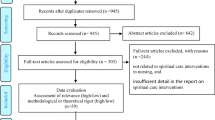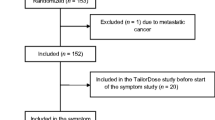Abstract
Objective
The objectives of this study were (a) to determine the psychometric properties of the Functional Assessment of Chronic Illness Therapy-Spiritual Well-Being (FACIT-Sp) scale and (b) to provide that FACIT scores behave one-dimensional to establish the mediating role of spiritual well-being in psychological distress and mental adjustment in a sample of patients with non-metastatic, resected cancer.
Method
A total of 504 consecutive patients completed the FACIT-Sp, Brief Symptom Inventory, and Mini-Mental Adjustment to Cancer scales. The dimensionality and structure of the scale were assessed by semi-confirmatory factor analysis; the reliability of the derived scale scores was evaluated using the omega coefficient, and regression analysis appraised the FACIT-Sp’s mediating role between psychological distress and mental adjustment.
Results
A clear and theoretically interpretable solution in two factors that agreed generally with solutions reported in other languages was obtained for the FACIT item scores and omega reliabilities of the derived Meaning/Peace (0.85) and Faith (0.86) scales were acceptable. The oblique solution in two factors was compatible with an essentially unidimensional solution of general well-being and associated strongly with psychological distress and mental adjustment. Spiritual well-being acted as a partial mediator between psychological distress and mental adjustment strategies, such as fighting spirit, hope, and cognitive avoidance.
Conclusions
The Spanish version of the FACIT-Sp scale is a reliable and valid clinical evaluation tool, and further highlights the potential clinical implications of spirituality for improving quality of life and adjustment to cancer.

Similar content being viewed by others
References
Bovero A, Leombruni P, Miniotti M et al (2016) Spirituality, quality of life, psychological adjustment in terminal cancer patients in hospice. Eur J Cancer Care (Engl) 25(6):961–969. https://doi.org/10.1111/ecc.12360
Scott-Ladd B, Chan CCA (2004) Emotional intelligence and participation in decision-making: strategies for promoting organizational learning and change. Strateg Chang 13(2):95–105. https://doi.org/10.1002/jsc.668
Peterman AH, Fitchett G, Brady MJ et al (2002) Measuring spiritual well-being in people with cancer: the functional assessment of chronic illness therapy— Well-being Scale (FACIT-Sp). Ann Behav Med 24(1):49–58. https://doi.org/10.1207/S15324796ABM2401_06
Mitchell AJ, Chan M, Bhatti H et al (2011) Prevalence of depression, anxiety, and adjustment disorder in oncological, haematological, and palliative-care settings: a meta-analysis of 94 interview-based studies. Lancet Oncol 12(2):160–174. https://doi.org/10.1016/S1470-2045(11)70002-X
Munoz AR, Salsman JM, Stein KD, Cella D (2015) Reference values of the Functional Assessment of Chronic Illness Therapy-Spiritual Well-Being: a report from the American Cancer Society’s studies of cancer survivors. Cancer 121(11):1838–1844. https://doi.org/10.1002/cncr.29286
Nejat N, Whitehead L, Crowe M (2017) The use of spirituality and religiosity in coping with colorectal cancer. Contemp Nurse 53(1):48–59. https://doi.org/10.1080/10376178.2016.1276401
Schnipper LE, Davidson NE, Wollins DS et al (2015) American Society of Clinical Oncology statement: a conceptual framework to assess the value of cancer treatment options. J Clin Oncol 33(23):2563–2577. https://doi.org/10.1200/JCO.2015.61.6706
Bai M, Lazenby M (2015) A systematic review of associations between spiritual well-being and quality of life at the scale and factor levels in studies among patients with cancer. J Palliat Med 18(3):286–298. https://doi.org/10.1089/jpm.2014.0189
McDermott DF, Regan MM, Clark JI et al (2005) Randomized phase III trial of high-dose interleukin-2 versus subcutaneous interleukin-2 and interferon in patients with metastatic renal cell carcinoma. J Clin Oncol 23(1):133–141. https://doi.org/10.1200/JCO.2005.03.206
Yeung NCY, Lu Q (2014) Affect as a mediator between self-efficacy and quality of life among Chinese cancer survivors in China. Eur J Cancer Care (Engl) 23(1):149–155. https://doi.org/10.1111/ecc.12123
Whitford HS, Olver IN (2012) The multidimensionality of spiritual wellbeing: peace, meaning, and faith and their association with quality of life and coping in oncology. Psycho-Oncology 21(6):602–610. https://doi.org/10.1002/pon.1937
Koenig HG (2009) Research on religion, spirituality, and mental health: a review. Can J Psychiatr 54(5):283–291. https://doi.org/10.1177/070674370905400502
Peterman AH, Reeve CL, Winford EC et al (2014) Measuring meaning and peace with the FACIT–Spiritual Well-Being Scale: distinction without a difference? Psychol Assess 26(1):127–137. https://doi.org/10.1037/a0034805
Canada AL, Murphy PE, Fitchett G et al (2008) A 3-factor model for the FACIT-Sp. Psychooncology 17(9):908–916. https://doi.org/10.1002/pon.1307
Murphy PE, Canada AL, Fitchett G et al (2010) An examination of the 3-factor model and structural invariance across racial/ethnic groups for the FACIT-Sp: a report from the American Cancer Society’s Study of Cancer Survivors-II (SCS-II). Psychooncology 19(3):264–272. https://doi.org/10.1002/pon.1559
Peterman AH, Fitchett G, Brady MJ et al (2002) Measuring spiritual well-being in people with cancer: the functional assessment of chronic illness therapy—Spiritual Well-being Scale (FACIT-Sp). Ann Behav Med 24(1):49–58. https://doi.org/10.1207/S15324796ABM2401_06
Derogatis LR (2001) BSI 18, Brief Symptom Inventory 18: administration, scoring and procedures manual. NCS Pearson, Incorporated
Watson M, Law MG, Santos MD et al (1994) The Mini-MAC: further development of the mental adjustment to cancer scale. J Psychosoc Oncol 12(3):33–46. https://doi.org/10.1300/J077V12N03_03
Bredal IS (2010) The Norwegian version of the Mini-Mental Adjustment to Cancer Scale: factor structure and psychometric properties. Psycho-Oncology 19(2):216–221. https://doi.org/10.1002/pon.1564
Kriston L, Scholl I, Hölzel L et al (2010) The 9-item Shared Decision Making Questionnaire (SDM-Q-9). Development and psychometric properties in a primary care sample. Patient Educ Couns 80(1):94–99. https://doi.org/10.1016/j.pec.2009.09.034
De las Cuevas C, Perestelo-Perez L, Rivero-Santana A et al (2015) Validation of the Spanish version of the 9-item Shared Decision-Making Questionnaire. Health Expect 18(6):2143–2153. https://doi.org/10.1111/hex.12183
Lorenzo-Seva U, Ferrando PJ (2013) FACTOR 9.2: a comprehensive program for fitting exploratory and semiconfirmatory factor analysis and IRT models. Appl Psychol Meas 37(6):497–498. https://doi.org/10.1177/0146621613487794
Hair JF, Black WC, Babin BJ (2010) RE Anderson multivariate data analysis: a global perspective
Hu L, Bentler PM (1999) Cutoff criteria for fit indexes in covariance structure analysis: conventional criteria versus new alternatives. Struct Equ Model A Multidiscip J 6(1):1–55. https://doi.org/10.1080/10705519909540118
Schermelleh-Engel K, Moosbrugger H, Müller H (2003) Evaluating the fit of structural equation models: tests of significance and descriptive goodness-of-fit measures. Methods Psychol Res Online 23–74
McDonald RP (1999) Test theory: a unified treatment. L. Erlbaum Associates, Mahwah
ten Berge JMF, Kiers HAL (1991) A numerical approach to the approximate and the exact minimum rank of a covariance matrix. Psychometrika 56(2):309–315. https://doi.org/10.1007/BF02294464
Jose PE (2003) MedGraph-I: a programme to graphically depict mediation among three variables: the internet version, version 2.0. Victoria Univesity Wellington, Wellington, New Zealand Retrieved Dec 31:2009
Baron RM, Kenny DA (1986) The moderator–mediator variable distinction in social psychological research: conceptual, strategic, and statistical considerations. J Pers Soc Psychol 51(6):1173–1182. https://doi.org/10.1037/0022-3514.51.6.1173
Ferrando PJ, Lorenzo-Seva U (2013) Unrestricted item factor analysis and some relations with Item Response Theory. Technical Report. Department of Psychology, Universitat Rovira i Virgili, Tarragona. http://psico.fcep.urv.es/utilitats/factor
Breitbart W, Rosenfeld B, Gibson C et al (2010) Meaning-centered group psychotherapy for patients with advanced cancer: a pilot randomized controlled trial. Psychooncology 19(1):21–28. https://doi.org/10.1002/pon.1556
Park CL, Chmielewski J, Blank TO (2010) Post-traumatic growth: finding positive meaning in cancer survivorship moderates the impact of intrusive thoughts on adjustment in younger adults. Psychooncology 19(11):1139–1147. https://doi.org/10.1002/pon.1680
Visser A, Garssen B, Vingerhoets A (2010) Spirituality and well-being in cancer patients: a review. Psycho-Oncology 19(6):565–572. https://doi.org/10.1002/pon.1626
Fradelos E, Tzavella F, Koukia E et al (2016) The translation, validation and cultural adaptation of functional assessment of chronic illness therapy—Spiritual Well-being 12 (facit-sp12) Scale in Greek language. Mater Socio Medica 28(3):229–234. https://doi.org/10.5455/msm.2016.28.229-234
Noguchi W, Ohno T, Morita S et al (2004) Reliability and validity of the Functional Assessment of Chronic Illness Therapy–Spiritual (FACIT–Sp) for Japanese patients with cancer. Support Care Cancer 12(4):240–245. https://doi.org/10.1007/s00520-003-0582-1
Lazenby M, Khatib J, Al-Khair F, Neamat M (2013) Psychometric properties of the Functional Assessment of Chronic Illness Therapy—Spiritual Well-being (FACIT-Sp) in an Arabic-speaking, predominantly Muslim population. Psycho-Oncology 22(1):220–227. https://doi.org/10.1002/pon.2062
Laidsaar-Powell RC, Butow PN, Bu S et al (2013) Physician-patient-companion communication and decision-making: a systematic review of triadic medical consultations. Patient Educ Couns 91(1):3–13. https://doi.org/10.1016/j.pec.2012.11.007
Scholl I, Kriston L, Dirmaier J, Härter M (2015) Comparing the nine-item Shared Decision-Making Questionnaire to the OPTION Scale—an attempt to establish convergent validity. Health Expect 18(1):137–150. https://doi.org/10.1111/hex.12022
Bench S, Day T (2010) The user experience of critical care discharge: a meta-synthesis of qualitative research. Int J Nurs Stud 47(4):487–499. https://doi.org/10.1016/j.ijnurstu.2009.11.013
Funding
This work was supported by FSEOM-Onvida for Projects on Long Survivors and Quality of Life. SEOM (Spanish Society of medical Oncology) 2015. The sponsor of this research has not participated in the collection, analysis, or interpretation of the data, in the writing of the report, or in the decision to submit the article for publication.
Author information
Authors and Affiliations
Contributions
All authors meet the appropriate authorship criteria and no author has been omitted from the list. All authors contributed to the concept and design of the manuscript, and critically reviewed and approved the final version.
Corresponding author
Ethics declarations
Conflict of interest
The authors declare that they have no conflict of interest.
Ethical statement
The study has been performed in accordance with the ethical standards of the Declaration of Helsinki and its later amendments. This study is an observational trial without intervention.
Informed consent statement
Signed informed consent was obtained from all patients.
Rights and permissions
About this article
Cite this article
Jimenez-Fonseca, P., Lorenzo-Seva, U., Ferrando, P.J. et al. The mediating role of spirituality (meaning, peace, faith) between psychological distress and mental adjustment in cancer patients. Support Care Cancer 26, 1411–1418 (2018). https://doi.org/10.1007/s00520-017-3969-0
Received:
Accepted:
Published:
Issue Date:
DOI: https://doi.org/10.1007/s00520-017-3969-0




